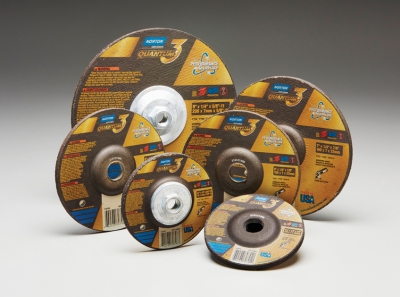
Saint-Gobain Abrasives has introduced Norton QUANTUM3 (NQ3) depressed-center grinding wheels. Featuring a proprietary grain along with a tough bond system that contains a unique combination of fillers and bonding agents that reportedly allow for much better mix quality in manufacturing, NQ3 provides substantially faster grinding for more metal removal and longer wheel life, with less operator fatigue, to significantly increase grinding output. Test results conducted with NQ3 and competitive wheels revealed that NQ3 removed almost twice the amount of carbon steel at five minute intervals.
Norton Quantum3 wheels are constructed using a precisely engineered iron, sulfur and chlorine-free resin technology to provide a uniform abrasive distribution throughout the wheel. This unique bond was designed for retaining the grains long enough during and after grain fractures. This subtle but powerful bond characteristic enables both excellent cut rates and exceptionally long wheel life.
“Norton Quantum3 grain tends to be more rounded than precision-shaped ceramic grain. This allows a more robust, sharper cutting action with less vibration, for much easier operator control. These wheels don’t grab or dig when used in any direction. They simply glide through the workpiece while removing metal. This also means the free cutting control can boost the amperage on its own without additional
pressure needed on the tool,” said Debbie Gaspich, Norton Abrasives director of product management, North America. “Norton Quantum3 grinding wheels are made in the USA and provide users the lowest total operating cost and the most productive grinding yield in the industry.”
The new Quantum3 wheels are offered in 12 Type 27 all-purpose grinding application SKUs, one Type 28 all-purpose and two Type 27 SKUs for foundry applications. All products are in stock. Sizes range from 4” x ¼” x 3/8”, to 9” x ¼” to 7/8”.
Contact Details
Related Glossary Terms
- abrasive
abrasive
Substance used for grinding, honing, lapping, superfinishing and polishing. Examples include garnet, emery, corundum, silicon carbide, cubic boron nitride and diamond in various grit sizes.
- fatigue
fatigue
Phenomenon leading to fracture under repeated or fluctuating stresses having a maximum value less than the tensile strength of the material. Fatigue fractures are progressive, beginning as minute cracks that grow under the action of the fluctuating stress.
- grinding
grinding
Machining operation in which material is removed from the workpiece by a powered abrasive wheel, stone, belt, paste, sheet, compound, slurry, etc. Takes various forms: surface grinding (creates flat and/or squared surfaces); cylindrical grinding (for external cylindrical and tapered shapes, fillets, undercuts, etc.); centerless grinding; chamfering; thread and form grinding; tool and cutter grinding; offhand grinding; lapping and polishing (grinding with extremely fine grits to create ultrasmooth surfaces); honing; and disc grinding.






